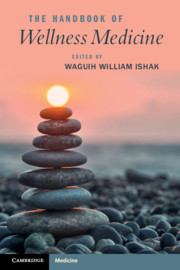Book contents
- The Handbook of Wellness Medicine
- The Handbook of Wellness Medicine
- Copyright page
- Dedication
- Contents
- Contributors
- Part I Approach to Wellness
- Part II From Illness to Wellness by Organ Systems/Disorders
- Chapter 6 The Concept of Wellness in Psychiatric and Substance-Use Disorders
- Chapter 7 Neurological and Neurosurgical Disorders and Wellness
- Chapter 8 Cardiovascular and Pulmonary Wellness
- Chapter 9 Gastrointestinal System and Wellness
- Chapter 10 Wellness and the Genito-Urinary System
- Chapter 11 Reproductive System
- Chapter 12 Allergic, Infectious, and Immunological Processes
- Chapter 13 Wellness in Endocrine and Metabolic Disorders
- Part III Special Populations and Special Topics
- Part IV Wellness Interventions
- Part V Wellness through Optimization of Work, Love, and Play
- Book part
- Index
- References
Chapter 13 - Wellness in Endocrine and Metabolic Disorders
from Part II - From Illness to Wellness by Organ Systems/Disorders
Published online by Cambridge University Press: 18 September 2020
- The Handbook of Wellness Medicine
- The Handbook of Wellness Medicine
- Copyright page
- Dedication
- Contents
- Contributors
- Part I Approach to Wellness
- Part II From Illness to Wellness by Organ Systems/Disorders
- Chapter 6 The Concept of Wellness in Psychiatric and Substance-Use Disorders
- Chapter 7 Neurological and Neurosurgical Disorders and Wellness
- Chapter 8 Cardiovascular and Pulmonary Wellness
- Chapter 9 Gastrointestinal System and Wellness
- Chapter 10 Wellness and the Genito-Urinary System
- Chapter 11 Reproductive System
- Chapter 12 Allergic, Infectious, and Immunological Processes
- Chapter 13 Wellness in Endocrine and Metabolic Disorders
- Part III Special Populations and Special Topics
- Part IV Wellness Interventions
- Part V Wellness through Optimization of Work, Love, and Play
- Book part
- Index
- References
Summary
Wellness is a term encompassing many aspects of the human experience, including physical health. Much of the regulation and maintenance of the human body occurs via hormonal expression. The human endocrine organs include the pituitary, adrenals, thyroid, testes, and ovaries, and produce many of the hormones responsible for maintaining homeostasis and optimal cellular function [1]. Many factors can alter hormonal expression, including aging, environmental toxins, disease, nutrition, and even stress [1]. Hormonal imbalances often lead to poorer health outcomes and decreased wellness in the long run. This chapter will give an overview of the most common endocrine disorders, how they impact wellness, and what has been done to improve patient quality of life (QOL).
- Type
- Chapter
- Information
- The Handbook of Wellness Medicine , pp. 160 - 176Publisher: Cambridge University PressPrint publication year: 2020

